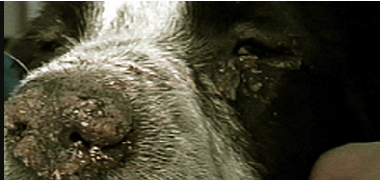Other Parvoviruses

RA-1
RA-1 virus is speculatively associated with rhematoid arthritis, however, no convincing evidence has been shown to prove an etiological link. This association was made because in 1987, the synovial fluid of 6/11 rhematoid arthritis patients had RA-1. (10)
Feline Panleukopenia
Also known as feline distemper, feline panleukopenia is caused by a parvovirus. The infected cats, raccoons, and minks. The infection causes vomiting, diarrhea, low white blood cell count, fever, depression, seizures, and death. It is transmitted through contact with feces or urine. There is a vaccine available for cats. (4,5)
Canine Parvovirus
Canine parvovirus is often fatal in dogs. It infects the heart muscle, causing heart failure, as well as the intestines, causing vomiting, fever, and lethargy. The virus is very similar to feline panleukopenia virus and there is evidence that the virus for the FPV vaccine jumped to dogs, becoming fatal. Transmission is through contact with fecal particles. There is now a vaccine for dogs. (4,5)
Human Bocavirus
Human bocavirus seems to be a newly emerging infectious disease that causes lower respiratory tract infections. Closely related to canine and bovine parvovirus, human bocavirus was discovered in several ill children of Sweden. In the last five years, children have been infected in Australia, Canada, and Europe. (8,9)
Mouse Parvovirus
The parvovirus of mice (MVM), as well as related rodent parvoviruses (H-1 and LuIII), all infect human cell lines. These viruses are, like adeno-associated virus, being considered excellent vectors for gene therapy. In the case of MVM, it has been shown that the viruses can be induced to kill malignant cells (oncolysis). Further research is currently being done to investigate its properties. (12)
